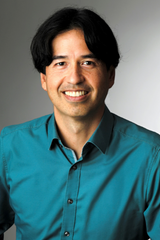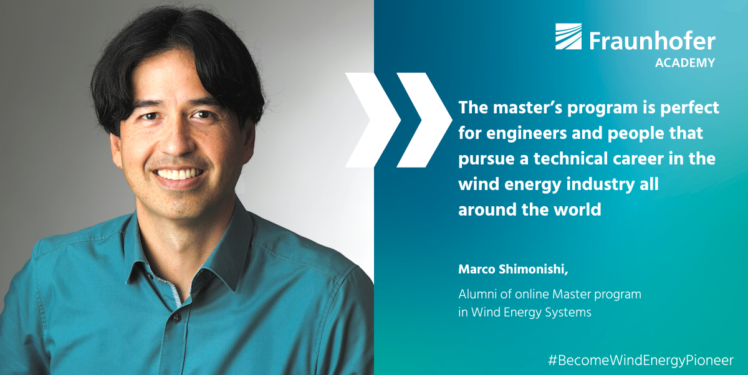You are interested in pursuing a career in the field of wind energy?
Then the online master program in Wind Energy Systems by the University of Kassel in scientific cooperation with the Fraunhofer IEE and Fraunhofer Academy might be perfect for you!
We met our former student Marco Shimonishi to ask him about his experience with the master’s program, how he combined his studies with his job and what to expect when studying Wind Energy Systems online.
Why did you choose to study wind energy and why this master’s program?
At the time when I applied for the master’s program, I was already working as a civil engineer and I was involved in projects regarding wind energy. I wanted to gain more specific knowledge on the topic of Wind Energy, so I looked for master’s programs with a comprehensive curriculum and that also enable me to educate myself next to my full-time-job. The modules immediately gave me the impression that I would obtain relevant knowledge for my professional activities.
Apart from my job, I also recognized the qualification in this field very useful for my future career since wind energy is a growing industry and the demands in general for clean energy are constantly rising.
So, to me it was quite clear by investing energy and resources in this master’s program, I could only benefit at the end.
How did your daily student life look like? How did you challenge the combination of an employer in a wind company and a wind student?
The program allows you to set your own pace for the studies. As I mentioned before, I worked a full-time-job, so I had to balance my studies with my job and my private life.
In the first years, I usually participated twice a week in the lectures in the afternoon. Additionally, on the weekends, I invested several hours to do home assignments, prepare material and study for upcoming exams.
During the first year of Covid I slowed down and bit and took some more time for my last modules to prepare for the Master thesis.
In case I couldn’t keep the pace of the module or I couldn’t participate in the final exam, I could always talk to the lecturers to find a solution. So, in general, there was quiet a lot of flexibility, which I really liked.
Can you briefly tell us about your main specializations you chose in the Master program Wind Energy Systems? Which modules and topics did you like most in the program?
I was quite interested in load calculations and structural design and analysis because as I said I am a civil engineer, so it was important for me to obtain knowledge related to loading and operating conditions and everything related to structural and foundation design.
Also, I really liked the topic of aerodynamics of wind turbines because it was a new discipline for me as civil engineer and also very relevant to load calculations.
It is interesting to see that wind energy systems are multi-disciplinary and how things connect, even on topics that are further away from my specific area, they always connect and meet when you put everything together.
How will you be able to use the content from the variety of Modules in a concrete and practical way for your everyday work?
The knowledge gained through the master program can be used in many contexts for example in engineering consultancy, wind turbines manufactory, load calculation, turbine design and optimization or wind farm development.
Because the program teaches both general knowledge and specific knowledge, the options are very wide-ranging.
What I like a lot, that the program provided me with background knowledge and brought me to a certain level in which I am able to have technical discussions with any experts from other specializations in wind energy.
The course is taught 100% online. What were the benefits of an Online program for you, precisely because you worked during the entire time while you were studying?
The biggest benefit was definitely the flexibility. There were two types of modules – synchronous and asynchronous modules. In one you have regularly live online lectures which give you the opportunity to ask questions and talk to other students and the lecturers. All lectures are recorded and can be watched at any time afterwards. There are other lectures that are recorded and that you can work through in your own pace.
There was a forum for each module to post questions and discuss topics with lecturers and students.
Lecturers from universities, industry and Fraunhofer have taught you in recent years. As a former wind student and a fresh alumnus, what advantages do you see in this model of such a learning alliance (University, Fraunhofer and industry)
I think it was a very good mix. People that work in the industry have a lot of practice knowledge and work-oriented perspective on things. The university, on the other hand, taught us the fundamentals, theory, and research. Lecturers from Fraunhofer with their applied research bring both sides, the university and the industry, together.
What was your favorite experience during the master’s program?
The course offers a 1-week project phase in present in which the students get to know different locations of the wind industry in Germany.
For me, it was a great opportunity to travel to Kassel and meet other students as well as the course lecturers and course management. We had an extensive program where we visited the Fraunhofer IEE and a wind farm in Kassel. We also visited a wind turbine manufacturer and also traveled to Bremerhaven to stop by the Fraunhofer IWES, where we visited testing facilities, and ended our trip in Hamburg for the WindEnergy fair. The 5-day trip gave us the opportunity to exchange our experience about the master’s program, e.g., tips for individual modules or how we can best combine work and study. It was also a great opportunity to network with other students and professionals working in the wind energy industry.
Who would you recommend the master’s program to?
The master’s program is quite technical, so it is perfect for engineers and people that pursue a technical career in the wind energy industry all around the world! But it also offers modules for additional competencies such as project management or energy and contract law, all of them with focus on wind energy.
Our Expert

Marco Shimonishi
Alumni of online Master program in Wind Energy Systems
Jutta Haubenreich ist seit 2009 in wechselnden Rollen bei Fraunhofer Academy tätig. Sie war u.a. für das übergreifende Marketing der Fraunhofer Academy und für die Betreuung und Vermarktung von Fraunhofer-Weiterbildungsprogrammen im Bereich Energie und Nachhaltigkeit zuständig. Aktuell betreut sie insbesondere die Fraunhofer Wasserstoff Education Community. Von 2011 bis 2017 war sie Projektleiterin und Koordinatorin des BMBF-Verbundprojektes »mint.online: Berufsbegleitende Studienangebote in MINT-Fächern«.
Von 2015 bis 2022 promovierte sie berufsbegleitend am Institut für Kommunikationswissenschaft und Medienforschung der LMU München zum Thema »Der Einfluss des Fernsehens auf Bildungsmotivation und -entscheidung«.


